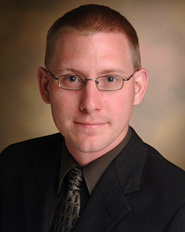
Alan Theisen (b. 4 October 1981; Port Huron, Michigan) is a Ph.D. graduate assistant in the Department of Music Theory at the Florida State University.
Composing since the age of sixteen, he has produced a steadily growing body of work distinguished by its musical energy and concentration of expression.
Representative works by Theisen include a Sonata for Alto Saxophone and Piano, Variations on a Theme of Gretchaninov, Eclogue for flute, and the Concerto for Alto Saxophone and String Orchestra (premiered by soloist Lawrence Gwozdz and the Szczecin Philharmonic in 2004). Recent compositions and commissions include Ritorno for flute and cello and a Triple Concerto. Noted composer Dimitri Terzakis commends Theisen's oeuvre as being "the product of a unique talent."
As a saxophonist, Theisen has toured the United States and Canada with the Sax-Chamber Orchestra, performing at two World Saxophone Congresses (Montreal - 2000, Minneapolis - 2003). He studied the instrument with internationally-recognized performer Lawrence Gwozdz and participated in masterclasses with famed saxophone pioneer Jean-Marie Londeix. No stranger to the podium, Theisen has been a guest conductor with several ensembles.
In an effort to showcase both his own original compositions and pieces by other contemporary composers, he founded the Intégrales New Music Festival in 2005. Now an annual event, Intégrales NMF features world-premiere performances by nationally recognized musicians. Intégrales has expanded to include musical collaborations with artists, authors, and dancers.
Theisen wrote his undergraduate thesis on György Ligeti's Piano Etudes, and has authored several papers on topics including Elliott Carter, film editing, composition as analysis, and Michael Brecker.
Other interests include mathematics, film criticism, and philosophy; in addition, Theisen has performed the role of Oberon in a production of Shakespeare's A Midsummer Night's Dream, for which he also wrote the incidental music.
Theisen lives with his wife (and puts up with their two cats) in Tallahassee, Florida.
|
|
|
|
|
|

Friday, August 18, 2006
Oh No...The Planets

In his Harmonie universelle (1636), Marin Mersenne spends a lot of time describing the harmony of the spheres.
His understanding of astronomy is based largely on Kepler (1571-1630), and thus, is based on the seven known planets (Jupiter is the root, Saturn is the second, the Moon is the third, Mercury is the fourth, Venus is the fifth, the Sun is the sixth, Mars is the seventh and Jupiter again the octave-- I don't understand why Jupiter is there twice, except that he needed an octave for his senario, and they couldn't see Pluto, etc.) So, anyway, God's triad is a pandiatonic sonority.
I was reminded of the above when today they ("they" being the society of people apparently in charge of naming things) announced that there are actually 12 planets.
So, the harmony of the spheres turns out to be chromatic, and I propose that we should be using more traditional, mod 12 descriptions of God in the future.
[Blogger's note: I am indebted to Joe Brumbeloe for the above observation.--AJT]
posted by Alan Theisen
Thursday, August 17, 2006
Two Longfellow Settings
Yesterday I finished my second setting of a text by Longfellow. Here are the first few measures:
 posted by Alan Theisen
posted by Alan Theisen
|
| |



